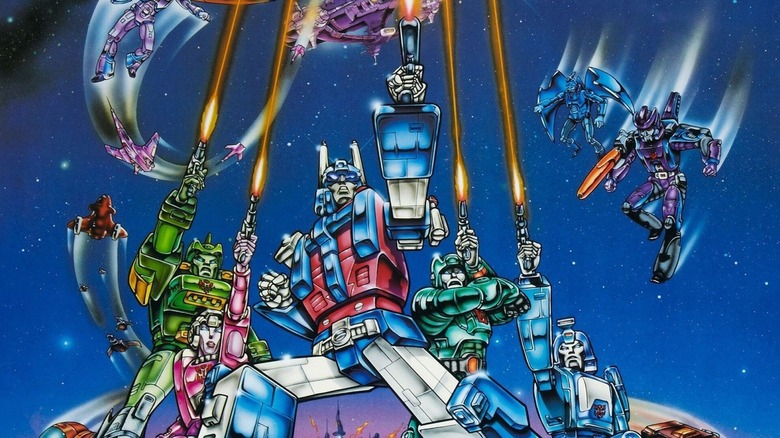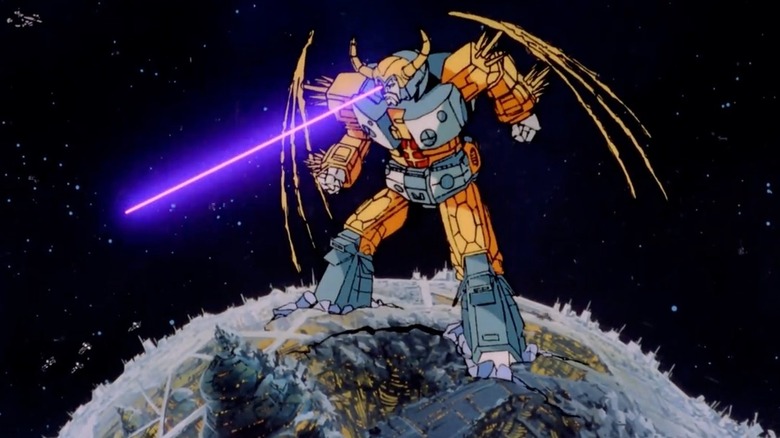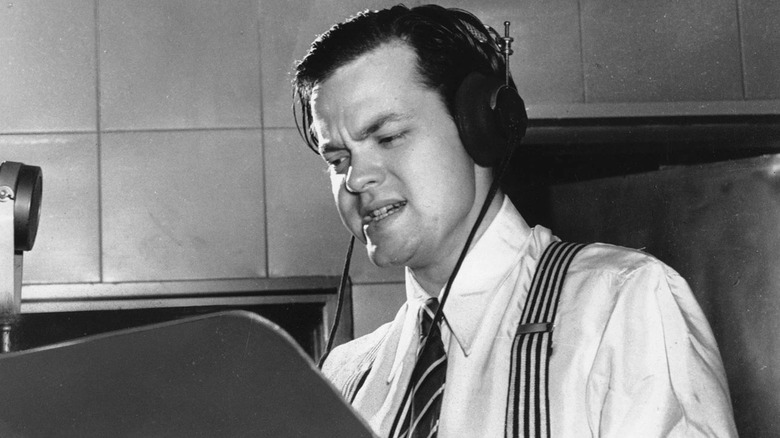The Cast Of Transformers: The Movie Were Given A Warning Before Working With Orson Welles
Orson Welles was just 26 when he wrote, produced, directed, and starred in "Citizen Kane." The 1941 film revolutionized the young industry. It boldly broke from the traditional linear storytelling pattern with a non-linear narrative told from several perspectives. Welles and cinematographer Gregg Toland introduced new cinematography techniques still used in modern filmmaking. Welles perfected the use of the montage, telling the complex life story of protagonist Charles Foster Kane in just under two hours. Welles broke established cinematic rules beginning with the film's opening moments.
The character Charles Foster Kane is loosely based on media magnate and yellow journalism originator William Randolph Hearst. But "Citizen Kane" might also have been a prophetic story of Orson Welles' own life. After multiple marriages, reclusive periods in his life, and struggles with weight as he aged left many to draw comparisons to his own creation, Charles Foster Kane.
The man that began his film career with the American Film Institute's top movie of all time ended his career with a performance in an often-forgotten 1986 animated movie based on children's toys. And the cast of "Transformers: The Movie" was given a warning before working with the screen legend.
Welles had a reputation of being difficult
Throughout his career, Orson Welles was constantly battling studios for creative control of his films. His personality and self-destructive behavior gave him a reputation for being difficult to work with. Known for his baritone voice, Welles would often turn to commercials and voice work (including narrating the "Revenge of the Nerds" trailer") to self-finance his projects.
This is how one of the most influential filmmakers of all time ended up playing a planet-sized robot named Unicron. In his own words, he spent the day "playing a toy." The 1986 Hasbro-produced film "Transformers: The Movie" was meant to kill off existing characters and introduce a new line of toys to children.
In addition to Welles, the movie featured actors known for their iconic voices such as Leonard Nimoy, Peter Cullen, Casey Kasem, and Robert Stack. Because of his reputation, the cast was specifically warned about working with Welles before he arrived to record his lines.
In the documentary "Til All Are One: Looking Back at Transformers: The Movie," story consultant Flint Dille talks about the intimidating aura surrounding the legendary filmmaker. Dille said:
"Orson Welles came in and he said, 'I hear I'm playing a whole planet.' And, I've said this before but, he looked like a whole planet. Orson Welles was a really big guy, he was like six-four, six-five, and at that point probably well over 400 pounds ... Everybody was afraid to be in the room or to encourage his wrath because [director] Wally [Burr] had been playing this tape of him just reaming some ad executive out, and nobody wanted to be the executive."
What the cast of "Transformers: The Movie" didn't know at the time is that they were witnessing Welles' last Hollywood production.
Welles died five days later
Orson Welles' final work in the industry coming in the form of character voice work in an animated children's movie is quite apropos. Before film, Welles was known for his iconic work in radio and the CBS radio program "The Mercury Theatre on the Air." Welles' production of H.G. Wells' "War of the Worlds" sent parts of the Northeast into a panic.
In 1937 he began playing the titular character in the crime-fighting radio drama "The Shadow." Flint Dille remembers talking with Welles about his work in radio shortly before the actor's death. Dille said:
"There was this minute where the techs were all messing with the sounds and the volumes. And at that point, I was really into Mercury Theatre and 'The Shadow' stuff that he did. So I was talking about 'The Shadow' and I think he thought that was really refreshing, that everybody always wanted to talk to him about 'Citizen Kane' and we were talking about radio."
Welles spent the better part of October 5, 1985, much like he spent a portion of his youth: In a sound studio in front of a microphone, bringing a character to life. Five days later, his own life would come to an end after a heart attack. "Transformers: The Movie" would be the final act for one of Hollywood's most influential people.
As for those warnings the cast received, they were unfounded. Despite failing health, "He [Welles] could not have been better," Dille reiterated more than once.


